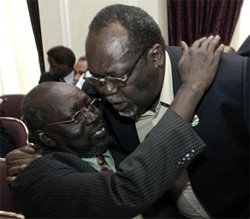As tragedy strikes in Darfur, agreement was signed
 Darfur Mob Hacks Translator To Death Day Aid Is Promised
Darfur Mob Hacks Translator To Death Day Aid Is PromisedIt is so sad that as the troubled Sudan region of Darfur, which is suffering through famine and genocide, has been promised a massive new influx of aid from the United States, a mob hacked to death a translator. Apparently, mob tensions ran high. The first attack was against a non-governmental organization staffer, which prompted the departure of U.N. humanitarian chief Egeland and his staff. The second occurred after Egeland left. The people of Darfur have been through so much pain and suffering it will take a long time to get the trouble region in order. More Detail Here
President Bush remains committed.
"Last week we saw the beginnings of hope for the people of Darfur. The government of Sudan and the largest rebel group signed an agreement and took a step toward peace. ....America will not turn away from this tragedy. We will call genocide by its rightful name, and we will stand up for the innocent until the peace of Darfur is secured." President Bush, May 8, 2006Here is the Darfur Agreement that was signed on May 8, 2006:
State Department Fact Sheet
Office of the Spokesman
Washington, DC
May 8, 2006The Darfur Peace Agreement, signed May 5, 2006, by the largest rebel group, the Sudan Liberation Movement, led by Mini Menawi, and the Sudanese Government, is an important achievement for peace in Darfur. It is a fair agreement that addresses the long-standing marginalization of Darfur, and charts a path for lasting peace for the innocent victims of the crisis.
The agreement requires that the Sudanese Government of National Unity complete verifiable disarmament and demobilization of Janjaweed militia by mid-October 2006 and places restrictions on the movements of the Popular Defense Forces and requires their downsizing. A detailed sequencing and phasing schedule ensures that the African Union certifies that Janjaweed and other armed militia have been disarmed before rebel forces assemble and prepare for their own disarmament and demobilization. The agreement stipulates that 4,000 former combatants be integrated into the Sudanese Armed Forces, 1,000 be integrated into the police forces, and 3,000 be supported through education and training programs. The former combatants will be integrated in groups of 100-150 and will comprise 33 percent of each integrated battalion.
Democratic processes have been laid out for the people of Darfur to choose their leaders and determine their status as a region. Rebel signatories of the agreement were awarded the 4th highest position in the Sudanese Government of National Unity: Senior Assistant to the President and Chairperson of the newly established Transitional Darfur Regional Authority (TDRA). The TDRA will be responsible for implementation of the peace agreement in Darfur and the rebel movements will have effective control of that body. In July 2010, a popular referendum will be held to decide whether to establish Darfur as a unitary region with a single government. For the three-year period prior to elections, the agreement grants the rebel movements twelve seats in the National Assembly in Khartoum, 21 seats in each of the Darfur State legislatures, one State Governor and two Deputy State Governors in Darfur, senior positions in State Ministries, and key posts in local governments.
The accord commits the international community to holding a donors’ conference to pledge additional funds for Darfur, and invites the TDRA Chairperson to present to that conference a summary of needs and priorities. The GNU is mandated to contribute $300 million initially and then $200 million/year for the next two years to rebuild the region. A Joint Assessment Mission – modeled on the one done for Southern reconstruction after the Comprehensive (North-South) Peace Agreement – will be established to determine the specific reconstruction and development needs of Darfur.
Buffer zones are to be established around camps for internally displaced persons and humanitarian assistance corridors, and a commission has been created to work with the United Nations to help refugees and displaced persons return to their homes. The agreement provides that the Sudanese Government will provide $30 million in compensation to victims of the conflict. 2006/472


0 Comments:
Post a Comment
<< Home